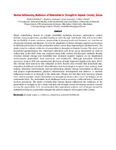| dc.description.abstract | Major contributing factors to climate variability including increased atmospheric carbon dioxide, rising temperature, possibly leading to more drought and floods. This will in turn alter the availability of water resources, productivity of grazing lands and livestock, the distribution of agricultural pests and diseases. As a result, adaptation to future changes requires an attention to stability and resilience of the production system rather than improving its absolute levels. The study aimed to evaluate resilience of pastoralists to droughts in Kajiado County. The study used household questionnaires, key informant interviews and focus group discussions as tools to collect data in the field. Data was analysed using both content and thematic methods. Results revealed climate change and variability had escalated negative impacts on the biophysical environment, pastoralists’ food insecurity and livelihoods. Although household livestock reduction by up to 80% was experienced, the terms of trade improved significantly since 2010. The chronic food insecurity was estimated at 66%. Results also revealed that household size, migration, livelihood and herds’ diversification and technological adoption (hay making, land zoning, veterinary interventions, and mainstreaming climate change information in planning and project implementation), physical infrastructure development and distance to markets influenced resilience to drought in the study sites. Despite the fact that early warning systems were used to provide timely information on drought incidences, there were no linkages at the community level. The pastoralists faced challenges such as access to credit and lack of extension services provisions. The study concludes that various factors influenced the resilience of the pastoralists to drought in the County and that and drought caused worsening resource scarcity among the pastoralists. It is recommended that appropriate policies and strategies should be instituted to help the pastoralists mitigate the adverse impacts of drought in the County. | en_US |

